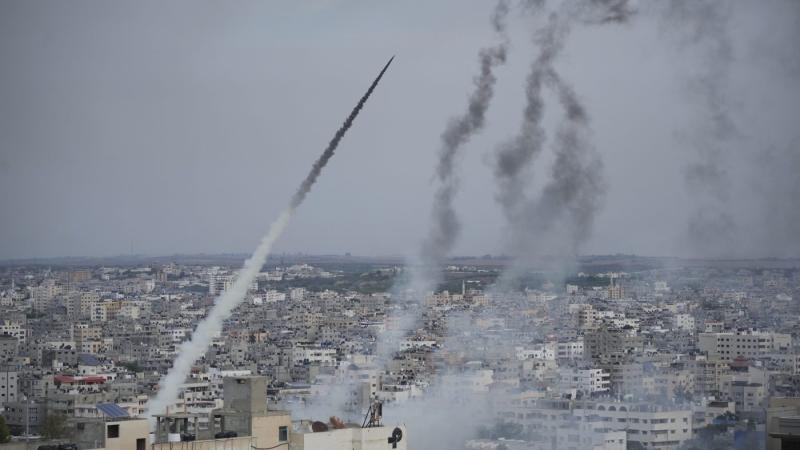The ghosts of Gaza (op-ed)



As I begin this column, terrorists have launched thousands of rockets and stormed civilian neighborhoods in a massive and unprovoked attack on Israel. I'm reminded of another moment, 18 years ago; a stunning, defining moment that has proven conclusively who is right and who is wrong in the brutal attack this weekend.
It was August 2005. I stood at the border of Israel and Gaza, as a member of Congress, to witness the unilateral withdrawal of Israeli citizens and troops from the territory. Under a scorching sun, dust heavy in the air, I was an eyewitness to the slow, final lowering of a gate at a border crossing; the curtain closing on Israel's presence in Gaza.
Several weeks earlier, the Israeli government had made a highly risky bet: If it ended 38 years of Israeli occupation of Gaza (which Israel had won after it was attacked by Egypt in 1967), the Palestinians would demonstrate an ability to live peacefully, stably, next to Israel.
I watched part of an operation that unilaterally dismantled Israeli settlements in the Gaza Strip. Israel's prime minister at the time, Ariel Sharon, and it's Knesset, demanded no preconditions, negotiations, guarantees or assurances; no treaties, agreements, memoranda of understanding. The withdrawal from Gaza was based on slender hope and heavy prayer that if Israel returned the land, Palestinian leaders would turn it into a fit and stable place.
The unilateral withdrawal was a searing process for Israel. I can't think of another country in history that has sent in its own armies to forcibly evict its own people from disputed territory. Israel did.
The Israel Defense Forces evicted Israeli citizens, demolished Israeli-owned buildings, evacuated security personnel. Thousands of Jewish settlers from dozens of settlements in the Gaza Strip were relocated. In many cases, troops went house to house, ordering settlers to leave and breaking down the doors of resisters. There were scenes of troops dragging sobbing families from homes and synagogues. And scenes of soldiers sobbing themselves: Jews warring against Jews to secure peace with Palestinians.
Jewish cemeteries were dismantled, bodies exhumed. Jewish bodies, wrenched from the ground by Jews, against the will of families. Where else, when else, has this happened?
By Sept. 12 the last Jew had left Gaza.
The bet made by Israel failed. A failed state was born.
In the land of the Bible, Isaac's proverb about beating swords into plowshares and spears into pruning hooks was an instant mockery.
Immediately following Israel's withdrawal, Palestinian crowds entered the settlements waving Hamas flags, firing gunshots into the air, ransacking homes, desecrating, looting, destroying a few remaining synagogues.
Palestinian Authority security forces refused to intervene. The remaining settlements' greenhouses, which would have been vital in agricultural developments, were looted. Banners proclaimed: "'Four years of resistance beat ten years of negotiations."
On Sept. 23, 2005, Palestinian leaders launched their first barrage of rockets against Israel. It was clear that the land would not produce businesses, seaside hotels, abundant farms for Gazans, but rockets against Israel. The rockets fell then, as now, but they were primitive, like a drizzle before a storm.
The rocket attacks continued in 2007. Israel responded the way any nation would respond when bombs fell on its people, launching defensive air strikes.
This has been the deadly cycle since that day, in 2005, when Israel left, quite literally in front of my eyes. I have returned many times since. On one visit, I met with a group of Israelis who lived near the Gaza border. I wanted to learn about tunnels that Hamas terrorists had burrowed deep into Israel.
I will always remember being told that residents had thought they'd gone crazy — hearing strange noises, the whispering of ghosts, beneath their homes, sensing that the apparitions were causing floors and walls to vibrate; then learning it was in fact caused by the digging of the tunnels.
What was worse, I wondered, the sense of losing one's mind at the sound of ghosts, or the reality that terrorists were burrowing under their children's beds? And while the tunnels were dug, more rockets flew. More attacks, abductions. Not to mention the abdication — the deathly abdication by the Palestinian leadership in Gaza to care for its own people.
Moments of clarity are rare in geopolitics. War is clouded with moral relativism, double standards, revisionist history. Please spare us the double standards and trite defenses, the need to see both sides of this conflict. More important than both sides is the one, irrefutable, irreducible truth.
In 2005, Israel withdrew unilaterally from Gaza, hoping for peace. It was repaid in the terror and tears we witness at this very hour. The decision for peace was unilateral, by Israel. The attacks today were also unilateral, by Palestinian terror groups.
The country that exhumed its own citizens from cemeteries in Gaza in its own sacrifice for peace now digs fresh graves in its national cemeteries. At this moment, clear and defined even through tears, the United States must act unequivocally.





The forced withdrawal from Gaza was a mistake. For starters, Israel should've required some concessions for leaving Gaza (which meant the Arabs would govern it). But they just left.
BTW here's one of the best articles on exactly what happened-- an excellent pictorial essay by Tom Gross:
Exodus From Gaza
The forcible evacuation of August 2005
Note: Tom Gross has an excellent site (the one I linked to in the previous comment) but I haven't looked at it for ...at least a few years! So much of the content may be very old. I haven't had time to check. So if you seed anything from that site be sure to check the date of the article!
I particularly recall shaking my head back then when reading about the Palestinians (Hamas?) destroying millions of dollars worth of greenhouses that were left in perfect condition and could have been used for their benefit. Those people have only the brains of animals, so how could we expect any difference today.
destroying millions of dollars worth of greenhouses that were left in perfect condition and could have been used for their benefit.
I remember that.
In 2000 Bill Clinton conducted "negotiations" at Camp David between the Israelis, led by the Prime Minister Ehud Barak, and the Palestinian leader Yasser Arafat. The result was failure.
The Israelis "proposals included the establishment of a demilitarised Palestinian state on some 92% of the West Bank and 100% of the Gaza Strip, with some territorial compensation for the Palestinians from pre-1967 Israeli territory; the dismantling of most of the settlements and the concentration of the bulk of the settlers inside the 8% of the West Bank to be annexed by Israel; the establishment of the Palestinian capital in east Jerusalem, in which some Arab neighborhoods would become sovereign Palestinian territory and others would enjoy "functional autonomy..."
Arafat's response?
" Arafat said no. Enraged, Clinton banged on the table and said: "You are leading your people and the region to a catastrophe." A formal Palestinian rejection of the proposals reached the Americans the next day. The summit sputtered on for a few days more but to all intents and purposes it was over....
...Barak portrays Arafat's behaviour at Camp David as a "performance" geared to exacting from the Israelis as many concessions as possible without ever seriously intending to reach a peace settlement or sign an "end to the conflict".
"He did not negotiate in good faith; indeed, he did not negotiate at all. He just kept saying no to every offer, never making any counterproposals of his own,"
And then, Arafat started the Second Intifada terror campaign against Israeli and its citizens that went on from September 28, 2000 to February 8, 2005.
This will result in additional Arab failure. Many countries have kicked Jewish ass, but the Arabs continue to demonstrate while dangerous, they remain inept.
By that you mean many countries have persecuted and murdered innocent Jews.
But mostly when they were not well armed.
Here's the real differences-- all those countries did it when the Jews didn't have their own country. So it was easy to mistreat them.
Now they have their own country. So if someone tries to severely mistreat them-- Israel can send in a warplane-- or several. Or if nearby, they can send in large numbers of heavily armed troops, tanks...artillery etc.
You got that right. Since 1948, Israel while greatly outnumbered, has consistently kicked Arab ass. I don't see that changing.
Good article Greg. I think that people who complain about Israel seem to forget how much they have tired to have peace.
We have one side trying to minimize civilian casualties, and another trying to maximize them (not to mention abuse their bodies for propaganda purposes). There is no equivalence between the two sides.